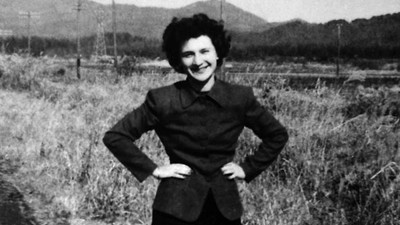正文
经济学人下载:贝雅特戈登
Beate Gordon
贝雅特·戈登
Beate Sirota Gordon, interpreter of Japan to Americans, died on December 30th, aged 89
贝雅特·希洛塔·戈登,美国的日本翻译官,于2012年12月30日逝世,享年89岁。
DRAFTING a constitution isn't something one does every day. It took Washington, Franklin and Co several months to achieve, that steamy summer in Philadelphia in 1787. When Beate Sirota was roped in to do it, in chilly, ruined Tokyo in the spring of 1946, she was amazed. She was no lawyer. She was 22, and only just an American citizen. Her idea of fun was going out every night. She had tagged on to General MacArthur's occupation army mostly to find her parents, whom she had left in Japan before the war. Her job, which she did very well, was to translate Japanese. But suddenly there she was, called in with two dozen men, to write—in deepest secrecy—the basic law for post-war Japan. In a week. “Beate, you're a woman,” said her colleagues. “Why don't you do the bit about women's rights?” “Wonderful, I'd love to!” she cried—and then realised she had no idea how.
起草宪法并不是一个人每天都要做的事。在1787年那个潮湿的夏日里,身处美国费城的华盛顿、富兰克林和其他一些人耗费了数个月才完成了美国宪法的起草工作。1946年春的东京,满目疮痍,春寒料峭,当得知被安排加入到战后日本国宪法的起草工作时,贝雅特感到十分吃惊。因为当时贝雅特只有22岁,也不是一名律师,仅仅是一个普通的美国公民而已。她脑海中有关乐趣的唯一概念就是每天晚上出门逛街。在日本,她一直与麦克阿瑟将军率领的驻日占领军生活,绝大部分时间是用在寻找二战发生前就已经与之失散的双亲。贝雅特最擅长的工作就是将日语翻译成英语。突然有一天,她和其他24个人被秘密地集中到一个地方,起草战后日本国宪法。时间是一周。与她一起起草宪法的一名同事对她说:“贝雅特,作为一个女人,你为什么不去为争取妇女的权益做点贡献呢?”贝雅特大声回答到,“太好了,我非常愿意去做”。可之后贝雅特才意识到她根本不知道从何做起。

She saw all too clearly, though, how women were treated in Japan. From the age of five to 15 she had lived there while her father Leo Sirota, a concert pianist from Ukraine, taught at the Imperial Academy. The land seemed enchanted to her, all exquisite gardens and cherry blossom and black-eyed, straight-haired children with whom, unusually for a Westerner, she was allowed to play. Over puppet shows and shuttlecock games she picked up the language, she claimed, in just three-and-a-half months. And she learned other things. Japanese women, for example, never came to her mother's parties. Only the men came. Japanese women would serve their husband's friends dinner, then eat alone in the kitchen. In the street they always walked three or four paces behind the men. They were usually married to men they did not know, could inherit nothing, and could even be bought and sold, like chattels.
贝雅特是十分清楚在日本国内妇女是如何被对待的。从五岁算起,贝雅特一共在日本生活了十年。他的父亲,利奥·希洛塔,是一位来自乌克兰的音乐会钢琴演奏家,在日本帝国学院任教。贝雅特被这片土地深深地吸引,对于她这样一位来自西方世界的人而言,精致的花园,美丽的樱花,能够与之一起玩耍的黑眼睛,直发的孩童,这里的一切都是不同寻常的。贝雅特声称,通过木偶戏和踢毽子,自己在三个半月的时间里就完全掌握了日语。除此之外,贝雅特也了解到了其他事情。比如,日本妇女从不参加自己母亲的聚会。母亲的聚会只有男人参加。日本的妇女在帮助自己丈夫和丈夫的朋友们享用完晚餐之后,才能一个人在厨房独自用餐。在街上,日本妇女通常只能跟在丈夫后面三步或四步远的地方。结婚之前,日本妇女根本不知道自己的丈夫是谁,父母死后也继承不到任何东西,她们甚至还会像牛羊一样被买卖。
Fired with her task, she raced in a requisitioned Jeep round Tokyo, borrowing other countries' constitutions from war-battered libraries. Rattling through them, she produced what became Article 24:
被接受的任务所激励,贝雅特开着申请到的吉普车穿梭于东京各个饱受战争损害的图书馆,借阅其中其他国家的宪法。正是由于贝雅特辛勤忙碌的工作,才有了后来日本国宪法的第二十四条:
Marriage shall be based only on the mutual consent of both sexes and it shall be maintained through mutual co-operation with the equal rights of husband and wife as a basis. With regard to choice of spouse, property rights, inheritance, choice of domicile, divorce and other matters pertaining to marriage and the family, laws shall be enacted from the standpoint of individual dignity and the essential equality of the sexes.
婚姻仅以两性的自愿结合为基础而成立,以夫妇平等权力为根本,必须在相互协力之下予以维持。 关于选择配偶、财产权、继承、选择居所、离婚以及婚姻和家庭等其他有关事项的法律,必须以个人尊严与两性平等为基础制订之。
There was plenty more, as she warmed to her mission: women's right to paid work, to custody of children, to equal education. Much of it was stripped out, because it made the men's eyes water on the American side as much as the Japanese. A kindly colonel pointed out that she had put in far more rights than were in America's constitution. She fired back that that wasn't hard. He told her that matters like divorce did not belong there. She informed him, from long experience of trying to sort out her parents' papers with Japanese bureaucrats, that if rights were not already mentioned in a constitution they would never be written into the civil code. Then, to her huge vexation, she burst into tears.
正如她从她的使命中所感受到的温暖那样,日本国宪法第二十四条的内容,远不仅仅如此:妇女享有报酬权、孩子监护权、平等接受教育权。但是,这些内容绝大部分被最终排除掉了,因为这些内容不仅会让美国男人也会让日本男人十分感动。一位友好的陆军上校向贝雅特指出,她在日本国宪法中起草的有关妇女权益的内容远远多过了美国宪法中的有关内容。贝雅特愤怒地回答到:“这并不难做到”。上校告诉她诸如离婚此类事情不应写进宪法中。贝雅特也义正言辞地告诉上校,基于她在日本有关官员的协助下长期收集整理父母有关材料的经历来看,如果此类权利不被写入宪法,那么它们就根本不可能写入民法中。话音落下,心中的苦恼使得贝雅特眼中的热泪夺眶而出。
The Japanese negotiators hated Article 24. But because they liked her, and because they were told that “Miss Sirota's heart is set on this” (with no word of the fact that this mere girl had also written it), they acquiesced. And so, to her astonished satisfaction, history was made. Whenever she visited Japan in later years women would cluster round to take her photograph, press her hand and thank her for her gift to them.
来自日本的谈判代表十分憎恶宪法第二十四条。但因为大家都喜欢贝雅特,也因为大家都知道“希洛塔女士的心执着与此(对这仅有的女士把条款已经撰写成的事实都不置一词)”,他们退却了。如此,历史已经证明贝雅特从中得到了令人吃惊的满足。在之后几年中,不管贝雅特何时重回故地,日本的妇女都会簇拥向前争相与之合影留念,握手,以表达她们对贝雅特所赠予她们的礼物的感谢。
Noh in Ohio
俄亥俄州的能剧
Looking back, she put it down mostly to luck. Luck that her father's work had taken her to Tokyo in 1929; luck that she had been allowed to absorb Japan and Japanese, but had been taught largely in American schools; luck that she had been able to get to Japan after the war, the first civilian woman to go there, and find her parents emaciated but safe; luck that MacArthur had picked her for his secret team.
回首过往,贝雅特将其中绝大部分归因于运气。在她看来,幸运地是,父亲的工作使得父亲能够在1929年把她带到东京;幸运地是,尽管她接受的大部分是美国教育,但她依然能够深入到日本以及日语之中;幸运地是,在二战后她还能回到日本,成为战后第一批到达日本的民间妇女,并成功寻找到身心憔悴但依然健在的双亲;幸运地是,她被麦克阿瑟将军挑选进他的秘密团队之中。
Yet skill was involved, too. She knew she had always understood Japanese better than most people: picking up as a student in California, for example, the threats and nuances that others missed in Japan's wartime propaganda broadcasts. In peacetime, she felt bound to do whatever she could to rebuild and improve understanding of the country. From 1954, on the staff of the Japan Society, she worked tirelessly to bring Japanese masters to America, so that people in Florida or Ohio could watch the bows and sips of the tea ceremony, or the gentle koto-playing that had delighted her as a child, or the masked solemnity of Noh plays. Moving on in the 1970s to the Asia Society, she travelled the continent—braving jungles, monsoons, the breathless peaks of Tibet and seven-hour banquets in Tashkent—to bring back Javanese dancers, water puppets from Hanoi, pansori-singers from Korea.
当然,个人才能也包括在其中。贝雅特深知一直以来她比大多数普通人更了解日本:例如,作为一个在加利福尼亚州成长起来的学童,贝雅特清楚的知道在日本战时广播宣传节目中存在的被其他加州人所忽略的言语之间的细微差别和威胁。在和平年代,贝雅特觉得自己有必要竭尽所能去重塑美国人对日本这个国家的认知。从1954年起,作为日本协会的工作人员,贝雅特不知疲倦地将众多日本艺术大师介绍到美国,从而使得在佛罗里达州和俄亥俄州的人们能够欣赏到诸如茶艺中的鞠躬和啜饮,或是在小时候让贝雅特兴奋不已的文雅的古筝表演,或是通过面具能传达庄严的能剧表演。20世纪70年代贝雅特所在的日本协会演变成亚洲协会—贝雅特游历亚洲大陆,勇敢地面对过丛林,季风,令人窒息的世界屋脊以及塔什干的七小时宴会,她为美国人民请回了爪哇的舞者,河内的水上木偶戏以及来自韩国的清唱歌手。
Immersed in all this, and aware that her post-war work had been secret, she never mentioned her constitution-drafting until 1995, when she wrote a memoir. After that, she was full of it. Yet, when all was said and done, she did not think Article 24 was the most important clause in Japan's post-war constitution. That honour, she said, belonged to Article 9, under which Japan renounced war and embraced peace. And hers was second.
贝雅特沉浸在这些工作之中的同时,对于她在战后所从事的工作有很高的保密意识。直到1995年,贝雅特才在自己的回忆录中提及她曾参与过日本国宪法的起草工作。在此之后,贝雅特对此感到很满意。可无论如何,贝雅特并不认为宪法第二十四条是战后日本国宪法中最重要的条款。在贝雅特看来,日本国宪法中最重要的条款是宪法第九条,因为在这项条款之下,日本国从此宣布放弃战争,拥抱和平,而她所撰写的宪法第二十四条的重要性不能与之相比。




 手机网站
手机网站